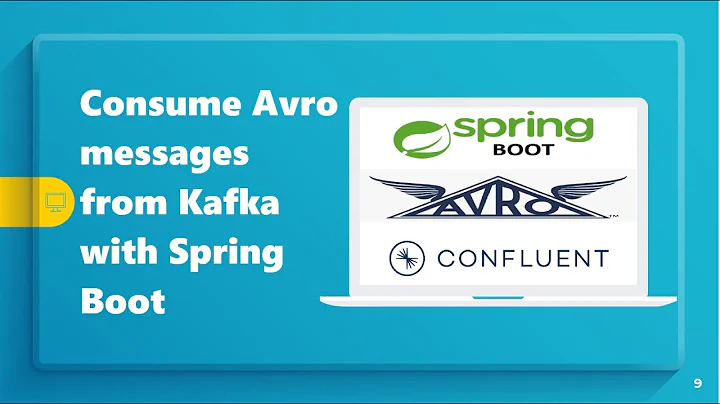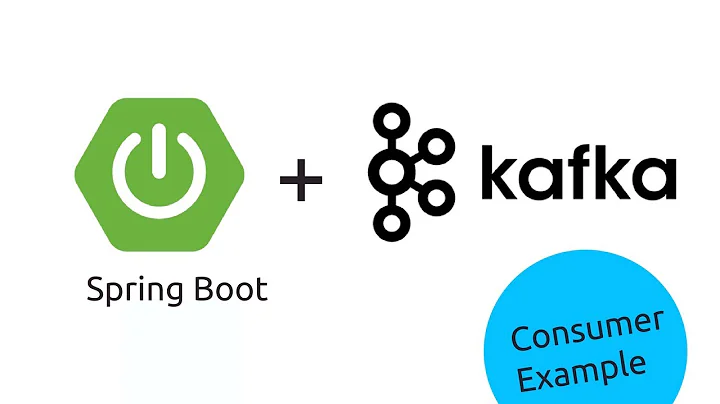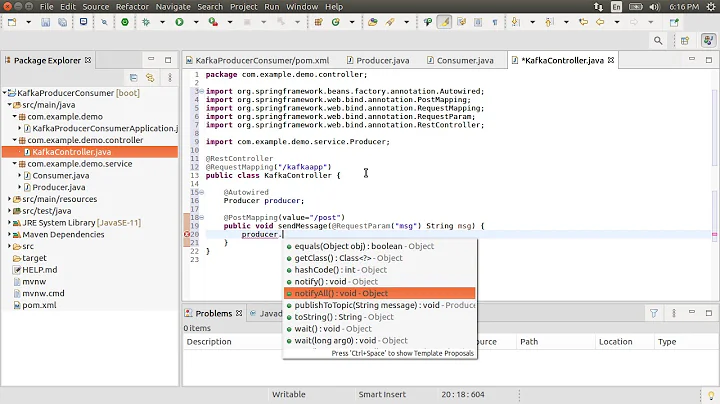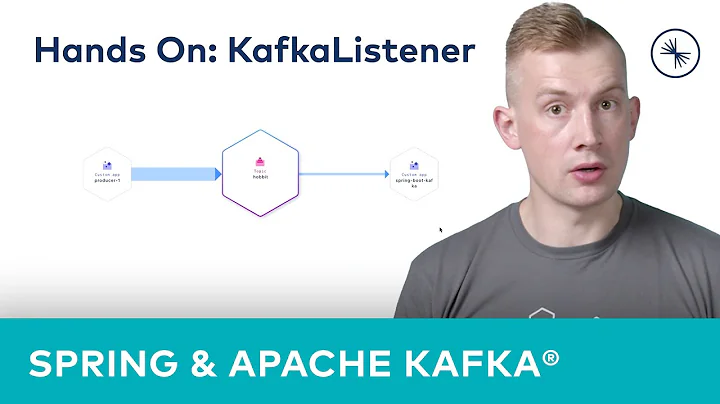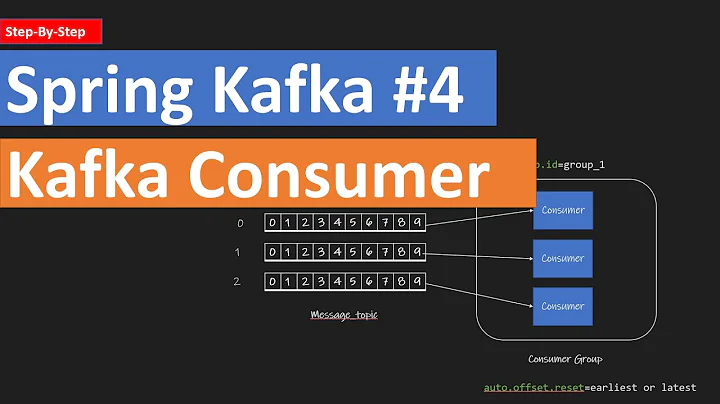Spring-Kafka consumer doesn't receive messages
group.id =
You need a group.id for the consumer.
Set it in the consumer factory properties.
BTW, when using boot, you don't need a consumer factory bean or container factory bean, you can use boot properties for that.
Logging can be enabled with logging.level... in the properties/yaml.
Related videos on Youtube
minizibi
Updated on June 04, 2022Comments
-
minizibi almost 2 years
I don't know whats going on that my java client consumer annotated with @KafkaListener doesn't receives any messages. When I create consumer via command line it works. Also Producer works as expected (also in java). Could someone help me to understand that behavior?
application.yml
kafka: bootstrap-servers: localhost:9092 topic: my-topicproducer config:
@Configuration public class KafkaProducerConfig { @Value("${kafka.bootstrap-servers}") private String bootstrapServers; @Bean public ProducerFactory<String, String> producerFactory(){ Map<String, Object> configProps = new HashMap<>(); configProps.put(ProducerConfig.BOOTSTRAP_SERVERS_CONFIG, bootstrapServers); configProps.put(ProducerConfig.KEY_SERIALIZER_CLASS_CONFIG, StringSerializer.class); configProps.put(ProducerConfig.VALUE_SERIALIZER_CLASS_CONFIG, StringSerializer.class); return new DefaultKafkaProducerFactory<>(configProps); } @Bean public KafkaTemplate<String, String> kafkaTemplate(){ return new KafkaTemplate<>(producerFactory()); } }consumer config:
@EnableKafka @Configuration class KafkaConsumerConfig { @Value("${kafka.bootstrap-servers}") String bootstrapServers; @Bean public ConsumerFactory<String, String> consumerFactory(){ Map<String, Object> props = new HashMap<>(); props.put(ConsumerConfig.BOOTSTRAP_SERVERS_CONFIG, bootstrapServers); props.put(ConsumerConfig.KEY_DESERIALIZER_CLASS_CONFIG, StringDeserializer.class); props.put(ConsumerConfig.VALUE_DESERIALIZER_CLASS_CONFIG, StringDeserializer.class); props.put(ConsumerConfig.AUTO_OFFSET_RESET_CONFIG, "earliest"); return new DefaultKafkaConsumerFactory<>(props); } @Bean public ConcurrentKafkaListenerContainerFactory<String, String> kafkaListenerContainerFactory(){ ConcurrentKafkaListenerContainerFactory<String, String> factory = new ConcurrentKafkaListenerContainerFactory<>(); factory.setConsumerFactory(consumerFactory()); return factory; } }Producer & Consumer:
@Service class Producer { @Autowired private KafkaTemplate<String, String> kafkaTemplate; @Value("${kafka.topic}") String kafkaTopic; public void send(String payload){ System.out.println("sending " + payload + " to " + kafkaTopic); kafkaTemplate.send(kafkaTopic, payload); } } @Service public class Consumer { @KafkaListener(topics = "${kafka.topic}") public void receive(String payload){ System.out.println(payload + " aaaaaaaaaaaaaaaaaaaaaaaaaaa"); } }Spring controller:
@RestController @RequestMapping(value = "/kafka") class WebRestController { @Autowired Producer producer; @GetMapping(value = "/producer") public String producer(String data){ producer.send(data); return "Done"; } }This is my console output, as you see It sends a message but method doesn't receive anything. It works if I'm not using spring-kafka, just pure kafka-api. It also works, when I bind consumer in command line - i see messages sent by java-code-producer.
2018-04-03 13:43:41.688 INFO 8068 --- [ main] o.a.k.clients.consumer.ConsumerConfig : ConsumerConfig values: auto.commit.interval.ms = 5000 auto.offset.reset = earliest bootstrap.servers = [localhost:9092] check.crcs = true client.id = connections.max.idle.ms = 540000 enable.auto.commit = true exclude.internal.topics = true fetch.max.bytes = 52428800 fetch.max.wait.ms = 500 fetch.min.bytes = 1 group.id = heartbeat.interval.ms = 3000 interceptor.classes = null internal.leave.group.on.close = true isolation.level = read_uncommitted key.deserializer = class org.apache.kafka.common.serialization.StringDeserializer max.partition.fetch.bytes = 1048576 max.poll.interval.ms = 300000 max.poll.records = 500 metadata.max.age.ms = 300000 metric.reporters = [] metrics.num.samples = 2 metrics.recording.level = INFO metrics.sample.window.ms = 30000 partition.assignment.strategy = [class org.apache.kafka.clients.consumer.RangeAssignor] receive.buffer.bytes = 65536 reconnect.backoff.max.ms = 1000 reconnect.backoff.ms = 50 request.timeout.ms = 305000 retry.backoff.ms = 100 sasl.jaas.config = null sasl.kerberos.kinit.cmd = /usr/bin/kinit sasl.kerberos.min.time.before.relogin = 60000 sasl.kerberos.service.name = null sasl.kerberos.ticket.renew.jitter = 0.05 sasl.kerberos.ticket.renew.window.factor = 0.8 sasl.mechanism = GSSAPI security.protocol = PLAINTEXT send.buffer.bytes = 131072 session.timeout.ms = 10000 ssl.cipher.suites = null ssl.enabled.protocols = [TLSv1.2, TLSv1.1, TLSv1] ssl.endpoint.identification.algorithm = null ssl.key.password = null ssl.keymanager.algorithm = SunX509 ssl.keystore.location = null ssl.keystore.password = null ssl.keystore.type = JKS ssl.protocol = TLS ssl.provider = null ssl.secure.random.implementation = null ssl.trustmanager.algorithm = PKIX ssl.truststore.location = null ssl.truststore.password = null ssl.truststore.type = JKS value.deserializer = class org.apache.kafka.common.serialization.StringDeserializer 2018-04-03 13:43:41.743 INFO 8068 --- [ main] o.a.kafka.common.utils.AppInfoParser : Kafka version : 0.11.0.0 2018-04-03 13:43:41.743 INFO 8068 --- [ main] o.a.kafka.common.utils.AppInfoParser : Kafka commitId : cb8625948210849f 2018-04-03 13:43:41.774 INFO 8068 --- [ main] o.s.b.w.embedded.tomcat.TomcatWebServer : Tomcat started on port(s): 8080 (http) with context path '' 2018-04-03 13:43:41.777 INFO 8068 --- [ main] kafka.KafkaExample : Started KafkaExample in 3.653 seconds (JVM running for 4.195) 2018-04-03 13:43:47.245 INFO 8068 --- [nio-8080-exec-3] o.a.c.c.C.[Tomcat].[localhost].[/] : Initializing Spring FrameworkServlet 'dispatcherServlet' 2018-04-03 13:43:47.245 INFO 8068 --- [nio-8080-exec-3] o.s.web.servlet.DispatcherServlet : FrameworkServlet 'dispatcherServlet': initialization started 2018-04-03 13:43:47.264 INFO 8068 --- [nio-8080-exec-3] o.s.web.servlet.DispatcherServlet : FrameworkServlet 'dispatcherServlet': initialization completed in 19 ms sending Hello to my-topic 2018-04-03 13:43:47.300 INFO 8068 --- [nio-8080-exec-3] o.a.k.clients.producer.ProducerConfig : ProducerConfig values: acks = 1 batch.size = 16384 bootstrap.servers = [localhost:9092] buffer.memory = 33554432 client.id = compression.type = none connections.max.idle.ms = 540000 enable.idempotence = false interceptor.classes = null key.serializer = class org.apache.kafka.common.serialization.StringSerializer linger.ms = 0 max.block.ms = 60000 max.in.flight.requests.per.connection = 5 max.request.size = 1048576 metadata.max.age.ms = 300000 metric.reporters = [] metrics.num.samples = 2 metrics.recording.level = INFO metrics.sample.window.ms = 30000 partitioner.class = class org.apache.kafka.clients.producer.internals.DefaultPartitioner receive.buffer.bytes = 32768 reconnect.backoff.max.ms = 1000 reconnect.backoff.ms = 50 request.timeout.ms = 30000 retries = 0 retry.backoff.ms = 100 sasl.jaas.config = null sasl.kerberos.kinit.cmd = /usr/bin/kinit sasl.kerberos.min.time.before.relogin = 60000 sasl.kerberos.service.name = null sasl.kerberos.ticket.renew.jitter = 0.05 sasl.kerberos.ticket.renew.window.factor = 0.8 sasl.mechanism = GSSAPI security.protocol = PLAINTEXT send.buffer.bytes = 131072 ssl.cipher.suites = null ssl.enabled.protocols = [TLSv1.2, TLSv1.1, TLSv1] ssl.endpoint.identification.algorithm = null ssl.key.password = null ssl.keymanager.algorithm = SunX509 ssl.keystore.location = null ssl.keystore.password = null ssl.keystore.type = JKS ssl.protocol = TLS ssl.provider = null ssl.secure.random.implementation = null ssl.trustmanager.algorithm = PKIX ssl.truststore.location = null ssl.truststore.password = null ssl.truststore.type = JKS transaction.timeout.ms = 60000 transactional.id = null value.serializer = class org.apache.kafka.common.serialization.StringSerializer 2018-04-03 13:43:47.315 INFO 8068 --- [nio-8080-exec-3] o.a.kafka.common.utils.AppInfoParser : Kafka version : 0.11.0.0 2018-04-03 13:43:47.315 INFO 8068 --- [nio-8080-exec-3] o.a.kafka.common.utils.AppInfoParser : Kafka commitId : cb8625948210849fEDIT:
kafka-topics.bat --create --zookeeper localhost:2181 --replication-factor 1 --partitions 13 --topic my-topicThis is my server.properties files:
# Licensed to the Apache Software Foundation (ASF) under one or more # contributor license agreements. See the NOTICE file distributed with # this work for additional information regarding copyright ownership. # The ASF licenses this file to You under the Apache License, Version 2.0 # (the "License"); you may not use this file except in compliance with # the License. You may obtain a copy of the License at # # http://www.apache.org/licenses/LICENSE-2.0 # # Unless required by applicable law or agreed to in writing, software # distributed under the License is distributed on an "AS IS" BASIS, # WITHOUT WARRANTIES OR CONDITIONS OF ANY KIND, either express or implied. # See the License for the specific language governing permissions and # limitations under the License. # see kafka.server.KafkaConfig for additional details and defaults ############################# Server Basics ############################# # The id of the broker. This must be set to a unique integer for each broker. broker.id=0 ############################# Socket Server Settings ############################# # The address the socket server listens on. It will get the value returned from # java.net.InetAddress.getCanonicalHostName() if not configured. # FORMAT: # listeners = listener_name://host_name:port # EXAMPLE: # listeners = PLAINTEXT://your.host.name:9092 #listeners=PLAINTEXT://:9092 # Hostname and port the broker will advertise to producers and consumers. If not set, # it uses the value for "listeners" if configured. Otherwise, it will use the value # returned from java.net.InetAddress.getCanonicalHostName(). #advertised.listeners=PLAINTEXT://your.host.name:9092 # Maps listener names to security protocols, the default is for them to be the same. See the config documentation for more details #listener.security.protocol.map=PLAINTEXT:PLAINTEXT,SSL:SSL,SASL_PLAINTEXT:SASL_PLAINTEXT,SASL_SSL:SASL_SSL # The number of threads that the server uses for receiving requests from the network and sending responses to the network num.network.threads=3 # The number of threads that the server uses for processing requests, which may include disk I/O num.io.threads=8 # The send buffer (SO_SNDBUF) used by the socket server socket.send.buffer.bytes=102400 # The receive buffer (SO_RCVBUF) used by the socket server socket.receive.buffer.bytes=102400 # The maximum size of a request that the socket server will accept (protection against OOM) socket.request.max.bytes=104857600 ############################# Log Basics ############################# # A comma seperated list of directories under which to store log files log.dirs=/tmp/kafka-logs # The default number of log partitions per topic. More partitions allow greater # parallelism for consumption, but this will also result in more files across # the brokers. num.partitions=1 # The number of threads per data directory to be used for log recovery at startup and flushing at shutdown. # This value is recommended to be increased for installations with data dirs located in RAID array. num.recovery.threads.per.data.dir=1 ############################# Internal Topic Settings ############################# # The replication factor for the group metadata internal topics "__consumer_offsets" and "__transaction_state" # For anything other than development testing, a value greater than 1 is recommended for to ensure availability such as 3. offsets.topic.replication.factor=1 transaction.state.log.replication.factor=1 transaction.state.log.min.isr=1 ############################# Log Flush Policy ############################# # Messages are immediately written to the filesystem but by default we only fsync() to sync # the OS cache lazily. The following configurations control the flush of data to disk. # There are a few important trade-offs here: # 1. Durability: Unflushed data may be lost if you are not using replication. # 2. Latency: Very large flush intervals may lead to latency spikes when the flush does occur as there will be a lot of data to flush. # 3. Throughput: The flush is generally the most expensive operation, and a small flush interval may lead to exceessive seeks. # The settings below allow one to configure the flush policy to flush data after a period of time or # every N messages (or both). This can be done globally and overridden on a per-topic basis. # The number of messages to accept before forcing a flush of data to disk #log.flush.interval.messages=10000 # The maximum amount of time a message can sit in a log before we force a flush #log.flush.interval.ms=1000 ############################# Log Retention Policy ############################# # The following configurations control the disposal of log segments. The policy can # be set to delete segments after a period of time, or after a given size has accumulated. # A segment will be deleted whenever *either* of these criteria are met. Deletion always happens # from the end of the log. # The minimum age of a log file to be eligible for deletion due to age log.retention.hours=168 # A size-based retention policy for logs. Segments are pruned from the log unless the remaining # segments drop below log.retention.bytes. Functions independently of log.retention.hours. #log.retention.bytes=1073741824 # The maximum size of a log segment file. When this size is reached a new log segment will be created. log.segment.bytes=1073741824 # The interval at which log segments are checked to see if they can be deleted according # to the retention policies log.retention.check.interval.ms=300000 ############################# Zookeeper ############################# # Zookeeper connection string (see zookeeper docs for details). # This is a comma separated host:port pairs, each corresponding to a zk # server. e.g. "127.0.0.1:3000,127.0.0.1:3001,127.0.0.1:3002". # You can also append an optional chroot string to the urls to specify the # root directory for all kafka znodes. zookeeper.connect=localhost:2181 # Timeout in ms for connecting to zookeeper zookeeper.connection.timeout.ms=6000 ############################# Group Coordinator Settings ############################# # The following configuration specifies the time, in milliseconds, that the GroupCoordinator will delay the initial consumer rebalance. # The rebalance will be further delayed by the value of group.initial.rebalance.delay.ms as new members join the group, up to a maximum of max.poll.interval.ms. # The default value for this is 3 seconds. # We override this to 0 here as it makes for a better out-of-the-box experience for development and testing. # However, in production environments the default value of 3 seconds is more suitable as this will help to avoid unnecessary, and potentially expensive, rebalances during application startup. group.initial.rebalance.delay.ms=0-
gotch4 about 6 yearshow are you creating the topic? do you get any output when sending messages? can you put log level to debug?
-
gotch4 about 6 yearsalso does the producer template has a flush method?
-
minizibi about 6 yearsI edited my question, yeah there is output, It sends the message, look between these console logs. There is "sending Hello to my-topic". I dont know how to set this logging to debug, its spring-boot application btw
-
-
minizibi about 6 yearsyeah I just noticed that.... Lost about 20 hours... why do I need group.id? while using in command line i just type 'kafka-console-consumer.bat --bootstrap-server localhost:9092 --topic my-topic --from-beginning' and it works without group id : >
-
 Gary Russell about 6 yearsThe console consumer generates a random
Gary Russell about 6 yearsThe console consumer generates a randomgroup.id. Kafka uses thegroup.idto assign partitions to group members. You don't need agroup.idif you assign partitions yourself (usingtopicPartitionson the annotation instead oftopics). We recently added code to fail fast if the user fails to provide agroup.idwhen one is needed.
